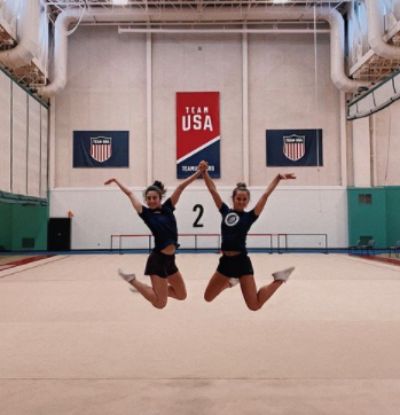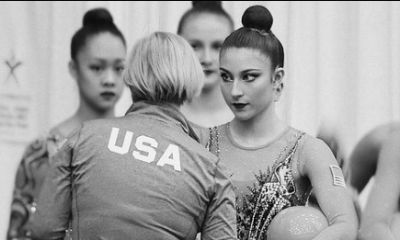Campus News
Blazing a Slug trail to the Olympics
Rhythmic gymnast Izzy Connor will be the first UC Santa Cruz student to compete in the Olympics—the result of years of both personal struggle and success.



When Izzy Connor (Crown ’25, astrophysics) steps onto the carpet at the Tokyo Olympics on August 7, it will be a milestone moment for the U.S. and also the highlight of years of both personal struggle and success.
Connor, who turns 21 on July 22, is a member of Team USA’s rhythmic gymnastics group, a five-member squad whose sport combines elements of dance and gymnastics with equipment like hoops, balls, ribbons, and clubs in heart-stopping routines. Hoops fly through the air to land on outstretched legs. Balls spin from teammate to teammate as the group moves in a perfectly choreographed routine. It’s a sport that requires hand-eye coordination, agility, stamina, and focus. Until now, U.S. athletes have never qualified for all three Olympic rhythmic gymnastics berths: two individual and one group.
“This is definitely an historic year for us,” Connor said by phone from the Lake Placid Olympic Center where she and her teammates were practicing before heading off to Israel for the Rhythmic Gymnastics Grand Prix competition and then on to the Olympics.
Her achievement, however, did not come easily. Not only did Connor spend years training—even leaving her Manhattan Beach, Calif., home her senior year of high school in order to practice at the North Shore Rhythmic Gymnastics Center in Deerfield, Ill.—she also had to refocus her goals after the 2020 Olympics were postponed because of the pandemic. In addition, in 2018, she faced a bout of severe anxiety and subsequent depression that forced her to rediscover her love for her career.
“I strongly believe you don’t fully start to know yourself or grow as a person until you’ve gone through something that breaks you,” Connor said of that time. “That’s when you start to grow and progress as a person.”
She turned her pain into power, she said.
According to Connor, she got a relatively late start in her sport. She dabbled in rhythmic gymnastics when she was 8 and then, drawn by its focus on artistry and dance, returned to the sport at age 10. It soon became her passion.
She never considered going to the Olympics, however.
“I thought it was too much pressure. I was very insecure and anxious as a kid,” she said. “I never allowed myself to dream big.”
Instead, she set small goals. The small goals, however, turned into big achievements and, at 17, she was asked to join the USA’s group national team and moved to Illinois to train. In 2018, however, she was hit suddenly with intense anxiety and panic attacks.
Connor struggled silently for a while and then, taking inspiration from decorated swimmer Michael Phelps, who has spoken openly about his depression, and also from four-time Olympic gold-medalist, gymnast Simone Biles, who has said regular visits to a psychiatrist and self-care helped ease her own anxiety, Connor decided to step out into the open and treat her anxiety like an injury that needed work to heal. She told her coach and her teammates of her struggles—they were very supportive, she said—and was able to find techniques that worked for her. Today, she considers herself healed and stronger than before.
In 2019, against the odds, the U.S. rhythmic gymnastics group secured a spot in the 2020 Tokyo Olympics, only to face disappointment when the games were postponed.
Now, however, Connor is heading toward Tokyo with the aim of helping the U.S. team succeed and is feeling good. When the games are over, she said, she plans to retire from her sport and take her spot at UC Santa Cruz, where she will study astrophysics at a campus she described as beautiful and peaceful. There, she said, she will also follow her second passion, which is writing. She hopes to pen articles about her experiences throughout her career as well as mental health advocacy as a way to help others.
“Though we sometimes seem superhuman, we athletes are human and experience the same emotions and struggles that everyone else does,” Connor said. “The important thing is that things such as anxiety and depression don’t need to stop you from doing what you dream about or define you. They should be normalized and addressed accordingly.”
Follow the team’s journey on Instagram @izzy.connor